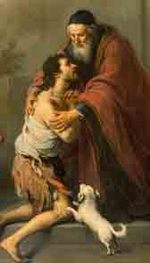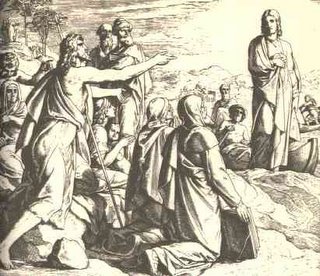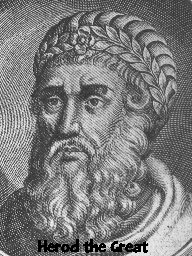 Icon of Christ the Teacher.
Icon of Christ the Teacher.(Fourth Sunday of the Year (B): This homily was given on
[For the audio version of this homily, click here: Fourth Sunday of the Year 2006]
The other day I came across some interesting stories about teachers and those associated with the teaching profession. Perhaps you’ve heard some of these before.
A little girl came home from school one day and said to her mother, “Mommy, today I was punished in school for something that I didn’t do.”
The mother said, “What? I can’t believe it. That’s so unfair! I’m going to have a talk with your teacher about this. By the way, what was it that you didn’t do?”
The little girl answered, “My homework.”
***********************************************************************************
A little boy came home from his very first day at school. His mother said to him, “What did you learn today, Johnny?”
Johnny replied, “Not enough. I have to go back tomorrow.”
***********************************************************************************
Nine-year-old Joey came home from CCD one night, and his mother asked him what he had learned.
Joey said, “Well, our teacher told us how God sent Moses behind enemy lines on a rescue mission to lead the Israelites out of
His mother said, “Now, Joey, is that REALLY what your teacher taught you?”
He said, “Well, no. But if I told you the story the way the teacher did, you’d never believe me!”
***********************************************************************************
Finally, one day not too long ago the phone rang in a school office at
The principal responded, “Okay. Thank you for calling. Now who is this?”
The voice on the other end replied, “Uh . . . uh . . . this is my father speaking!”
To the St. Pius students here present, Principal Fiore says, “Don’t get any ideas!”
Which brings us to Jesus Christ. First and foremost, Jesus is a Savior—our Lord and Savior. He came to die, so that we might live. If you’ve seen the movie, “The Lion, the Witch and the Wardrobe,” you understand this—or at least you should. The sacrifice of the great lion, Aslan, is meant to reflect, in some small way, the sacrifice Jesus made for all of us on Good Friday some 2,000 years ago.
But Jesus is not only a Savior; he is also a teacher. In fact, when you read the New Testament, you see that our Lord spent most of his earthly ministry doing three things: healing the sick, casting out demons, and teaching people the Gospel message in its fullness.
In today’s Gospel text from Mark 1, for example, we’re told that Jesus taught in a synagogue and then performed a spectacular exorcism. Immediately afterward he healed many people who were sick, including Simon Peter’s mother-in-law.
So here—in this one chapter of the Bible—we see Jesus engaged in all three of the activities I just mentioned: teaching, healing and casting out demons.
Obviously the healings and exorcisms Jesus performed were unique and extraordinary. Very few people would dispute that fact. But there was also something unique and extraordinary about the way our Lord taught.
To put it quite simply, Jesus was not your typical teacher!
That’s clear from this Gospel, in the line where St. Mark tells us, “The people were astonished at [Jesus’] teaching, for he taught them as one having authority and not as the scribes.”
Now what exactly does that mean? What is St. Mark telling us when he says that Jesus taught with “authority,” and not like the scribes did?
Basically he’s telling us that Jesus spoke with the voice and authority of God himself!
Whenever the scribes taught, they would always try to bolster their arguments by quoting other teachers and other scholars of the Law. And that’s quite understandable. They did that because they were fallible human beings. But Jesus was (and is) God! Consequently, he spoke in his own name. He didn’t need any other authority on this earth to verify the truth of what he said.
Thus it should come as no surprise to us that Jesus demanded obedience—total obedience from his listeners! Since his message was also God’s message, he expected everyone to heed his words and put them into practice—for their own good! As he said at the end of the Sermon on the Mount: “Anyone who hears my words and puts them into practice is like the wise man who built his house on rock. When the rainy season set in, the torrents came and the winds blew and buffeted his house. [But] it did not collapse; it had been solidly set on rock.”
Isn’t it too bad that Jesus isn’t still with us today?
Wouldn’t it be great if we had a teacher among us like him—a teacher with that type of God-given authority? Then we would know with absolute certitude what theLord expected of us in this life! Then we would know what we needed to do to be happy—and to save our souls!
Well, guess what.
We do have that teacher among us today! And it’s not the pope (although he’s her official spokesperson). This teacher—whose authority comes from Jesus himself—is a Bride and also a Mother; she’s the Bride of Christ, and our holy, spiritual Mother. We commonly refer to her as “the Church.”
Whenever the Church speaks to us officially on matters of faith and morals, we need to understand something: At those moments Jesus Christ is speaking to us as authoritatively as he spoke to people during his earthly ministry 2,000 years ago!
Do we listen? And, even more importantly, do we say “Amen” to what we hear?
Today, as we all know, many Catholics “pick-and-choose” which teachings of the Church they’re going to follow.
But that’s really nothing new. The very same phenomenon occurred back in the first century!
The fact is, people respond to the Church today in the very same ways that they responded to the historical Jesus 2,000 years ago: some believe; some don’t believe; and some “pick and choose” which teachings they will accept. Think, for example, of the many people who heard the famous Bread of Life discourse in John, chapter 6. Jesus told this crowd that in the near future he would give them his Body and Blood for their spiritual nourishment. He said (among other things), “I am the bread of life”; “If anyone eats this bread he shall live forever”; “If you do not eat the flesh of the Son of Man and drink his blood, you have no life in you.”
When Jesus finished this incredible sermon, we’re told that many of those who heard him walked away! His 12 apostles didn’t, but the Bible tells us that many others who had previously been his devoted followers—his disciples—stopped being so that day!
They accepted everything else Jesus had said up to that point in his ministry, but they rejected this teaching on the Holy Eucharist.
The rich young man that we hear about in Mark 10 was another “picker-and-chooser”. Scripture tells us that he accepted all the commandments—he said “Amen” to all the precepts of the Decalogue—but he rejected Jesus’ command to sell his possessions and become his follower.
True disciples of Christ accept all of his teachings on faith and morals as well as all of his commands—not just the easy ones; not just the appealing ones.
On this day that begins Catholic Schools Week, I’m proud to say that here, at St. Pius (both in our school and CCD program) we strive to teach our young people the full truth of the Gospel as the Church—and Christ—would have us do. We do it because we want our young people to be happy, healthy and holy.
To underscore that point let me conclude my homily now with one last story. One day a second grade teacher said to her students, “Children, suppose there were 12 sheep, and 6 of them jumped off a cliff. How many would be left?”
Little Norman raised his hand and said, “None.”
The teacher responded, “
As the Lord’s sheep, it’s essential that we follow the right teacher—and that we help our children to do the same: the teacher who wants what’s best for us; the teacher who speaks with the authority of Jesus; the teacher who will keep us—and our children—away from the “cliffs” of this life.


